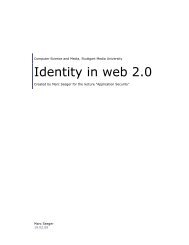The current state of anonymous file-sharing - Marc's Blog
The current state of anonymous file-sharing - Marc's Blog
The current state of anonymous file-sharing - Marc's Blog
You also want an ePaper? Increase the reach of your titles
YUMPU automatically turns print PDFs into web optimized ePapers that Google loves.
<strong>of</strong> its leaves QRP Tables. If the bit in the leaves QRP table is set to 0, the search querry<br />
won’t be forwarded as there won’t probably be any result anyway. If the leaf has a 1 at<br />
the corresponding position <strong>of</strong> its QRP Table, the result is forwarded and the information<br />
about <strong>file</strong>name, <strong>file</strong>size etc. are transmitted back to the ultrapeer that forwarded the<br />
the search query. To keep unnecessary querries between ultrapeers down to a minimum,<br />
each ultrapeer XORs the QRP-Tables <strong>of</strong> each <strong>of</strong> its leaves and generates a composite<br />
table <strong>of</strong> all the things his leaves are <strong>sharing</strong>. <strong>The</strong>se composite tables are being exchanged<br />
between ultrapeers and help the a ultrapeer to decide for which one <strong>of</strong> its own ultrapeer<br />
connections the search queries won’t generate any results anyway. This allows the ultra-<br />
peer to direct search queries with a TTL <strong>of</strong> 1 only to ultrapeers which will answer with<br />
a result. Because <strong>of</strong> the high number <strong>of</strong> intra-ultrapeer connections (32 in Limewire),<br />
each relayed search can produce up to 32 times the bandwidth <strong>of</strong> the previous hop. A<br />
TTL 3 query being sent to one ultrapeer will generate up to 32 query messages in its<br />
second hop, and up to 1024 (32*32) in its third hop. <strong>The</strong> final hop accounts for 97%<br />
<strong>of</strong> the total traffic (up to 32768 messages). This is exactly where ultrapeer QRP comes<br />
really into play.<br />
4.4.4 Dynamic Querying<br />
Another thing that is being used in Gnutella to keep the incoming results and network<br />
traffic down to a minimum is called "Dynamic Querying". Dynamic querying is a series<br />
<strong>of</strong> searches which are separated by a time interval. As an ultrapeer performing dynamic<br />
querying, it will do the first step, wait 2.4 seconds, and then do the second step. If the<br />
first or second search gets more than 150 hits, no more searches will be started because<br />
150 hits should be enough and further searches should use more specific search terms to<br />
get the amount <strong>of</strong> results down. If the last search lasts for more than 200 seconds, the<br />
ultrapeer will give up and stop.<br />
<strong>The</strong> first step:<br />
<strong>The</strong> first search is being directed only the leaves directly connected the the ultra-<br />
peer that received the search query (–> TTL 1: only one hop). <strong>The</strong> ultrapeer<br />
searches the QRP Tables and forwards the search to the leaves that are likely<br />
to have an result. If less than 150 results are returned, the second step is being<br />
started. If more than 150 results are returned, the search has <strong>of</strong>ficially ended and<br />
no more "deeper" searches will be started.<br />
<strong>The</strong> second step:<br />
23



